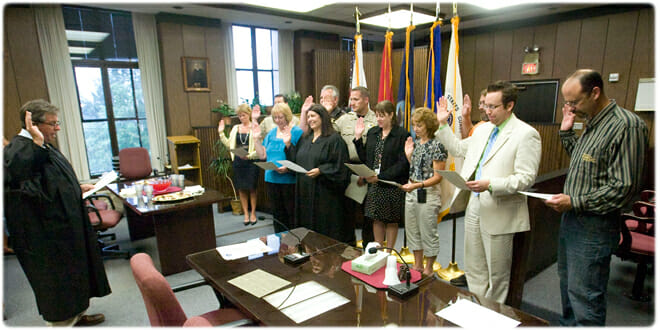
What is a Veterans Treatment Court?
By Guest Contributors Judge Cynthia M. Davis & Jacob Patten
It’s not uncommon for military veterans returning from a war zone to have difficulty assimilating back into their community and adapting to the rhythms of home and family. Many seek to escape from the trauma of past experiences by self medicating with drugs and/or alcohol. According to the RAND Center for Military Health Policy Research, one in five veterans has symptoms of a mental health disorder or cognitive impairment, and one in six veterans who served in Iraq or Afghanistan suffers from a substance abuse issue.
The Veterans Administration (VA) and local courts recognize these issues facing veterans that, when left untreated, sometimes result in involvement in the criminal justice system. Veterans Treatment Courts are a relatively new and innovative way to assist justice-involved veterans by diverting them from the traditional criminal justice system to a court focused on treatment and rehabilitation.
The Veterans Treatment Court model requires participants to enter into an agreement with the State (the District Attorney) in which they agree to attend regular court hearings, attend treatment sessions as recommended under an individualized treatment plan, engage in frequent and random drug and alcohol testing, and maintain absolute sobriety. Veterans are also held accountable to the community and victims through requirements of community service, apology letters and payment of restitution (where applicable).
If veterans cooperate and remain compliant with program rules, they are recognized by the court and receive incentives. If veterans are non-compliant, the court responds using a series of evidence-based responses designed to change the veterans’ behaviors.

If veterans successfully complete the terms of the agreement, which lasts between 6 to 18 months (depending on the charge), they receive a benefit such as their criminal charges dismissed or reduced or an early termination of their probation. For those who are unsuccessful, they face negative consequences such as additional jail time or revocation of probation. Veterans typically respond favorably to this structured environment given their past experience in the military. However, some do struggle, and those are the veterans who need a Veterans Treatment Court the most.
The nation’s first Veterans Treatment Court was established in 2008 in Buffalo, New York, under Judge Robert Russell in response to the growing number of veterans on his docket suffering from substance use and/or mental health issues. Since 2008, Veterans Treatment Courts have become the nation’s fastest growing treatment court with over 400 operating across the country.

Established in 2012, the Milwaukee County Veterans Treatment Court has served over 350 veterans and has a 78% success rate. The court involves traditional system partners such as the Judge, District Attorney’s Office, Public Defender’s Office, Department of Corrections and Law Enforcement. The additions of the Department of Veterans Affairs (Veterans Justice Outreach), volunteer veteran mentors, and other veterans’ community organizations are what separates Veterans Treatment Courts from other types of treatment courts.
Studies provided by Justice for Vets, a national organization providing training and advocacy for Veterans Treatment Courts, show that veterans who complete these programs display significant improvements in substance abuse, mental health and other pro-social areas. They go on to reunite with families while stabilizing housing, employment, social support and other factors that place them at risk to re-offend.
For more information about the Milwaukee County Veterans Treatment Court, please visit the web-site:
https://county.milwaukee.gov/EN/Courts/Chief-Judge/Veterans-Treatment-Court.
Sources:
What is a Veterans Treatment Court, Justice for Vets, https://justiceforvets.org/what-is-a-veterans-treatment-court/ (last visited November 15, 2021).
Flatley et al., A National Study of Veterans Treatment Court Participants: Who Benefits and Who Recidivates, Adm. Policy Mental Health 45(2), p. 236 (Mar. 2018).
Knudsen, K. J., & Wingenfeld, S., A Specialized Treatment Court for Veterans with Trauma Exposure: Implications for the Field, Community Mental Health Journal 52(2), p. 127 (2016).
